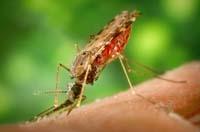A world without mosquitoes, a wonderful world?
Besides the diseases, the problems that cause the pests make the disappearance of mosquitoes a benefit. From northeastern Canada to Russia, millions of mosquitoes are born when ice melts. For three or four weeks they become adults, all together, forming at times dense clouds. Besides being unbearable for people, they are harmful to the tribes, among other things: each Caribbean is sucked 300 milliliters of blood a day. For them, a world without mosquitoes would also be better.

It is being investigated through the Internet to know the proportions of the most attractive body of women and men. In the image, image of Leonardo da Vinci. (Photo: CDC)
But can the disappearance of mosquitoes have negative side effects? This is the question that the scientific journal Nature has asked several experts. Among them are biologists, ecologists, doctors and entomologists who do not agree at all. Although for some it would only be benefits, for others it would have no effects or would be harmful.
According to the journal Nature, scientists know 3,500 species of mosquitoes, of which only 200 are sharp to people. They inhabit all continents and habitats and perform important functions in different ecosystems. They have been on Earth for more than a hundred million years and have evolved with many species. Thus, some experts consider that mosquitoes are important. Among other things, they have said that if mosquitoes were lost, some predators would run out of prey and some plants without pollinator.
Tests and other opinions
They have also given examples as a study conducted in Camarge, France. In a park of the city an anti-mosquito microorganism was installed by spray. Feeding on mosquitoes and other insects, enara solomillos wanted to know if staying without a mosquito had consequences for them. The result was significant, with 2 chicks on average after the spray and 3 in the control group.
Besides many birds, mosquitoes feed on spiders, frogs, lizards, lizards, fish and other animals. On the other hand, mosquitoes break down the dead organic matter present in water and release substances for plants such as nitrogen.
In addition, they are pollinators of many types of plants. And their disappearance would not only affect the plants. In the end it would affect us: In the words of the evolutionary ecologist Dina Fonseca, the disappearance of a type of mosquito in the tropics would mean a "world without chocolate".
However, many experts believe that the space left by mosquitoes in ecosystems would be easily occupied by other living beings. However, some doctors say it would have a clear ecological consequence: "We will have more people." Therefore, some person might think that the proliferation of mosquitoes can be a good measure to control overpopulation. However, doctors have not said so, but suggest that the money saved in the healing of diseases can be allocated to food and education.
Published in Gara
Buletina
Bidali zure helbide elektronikoa eta jaso asteroko buletina zure sarrera-ontzian











